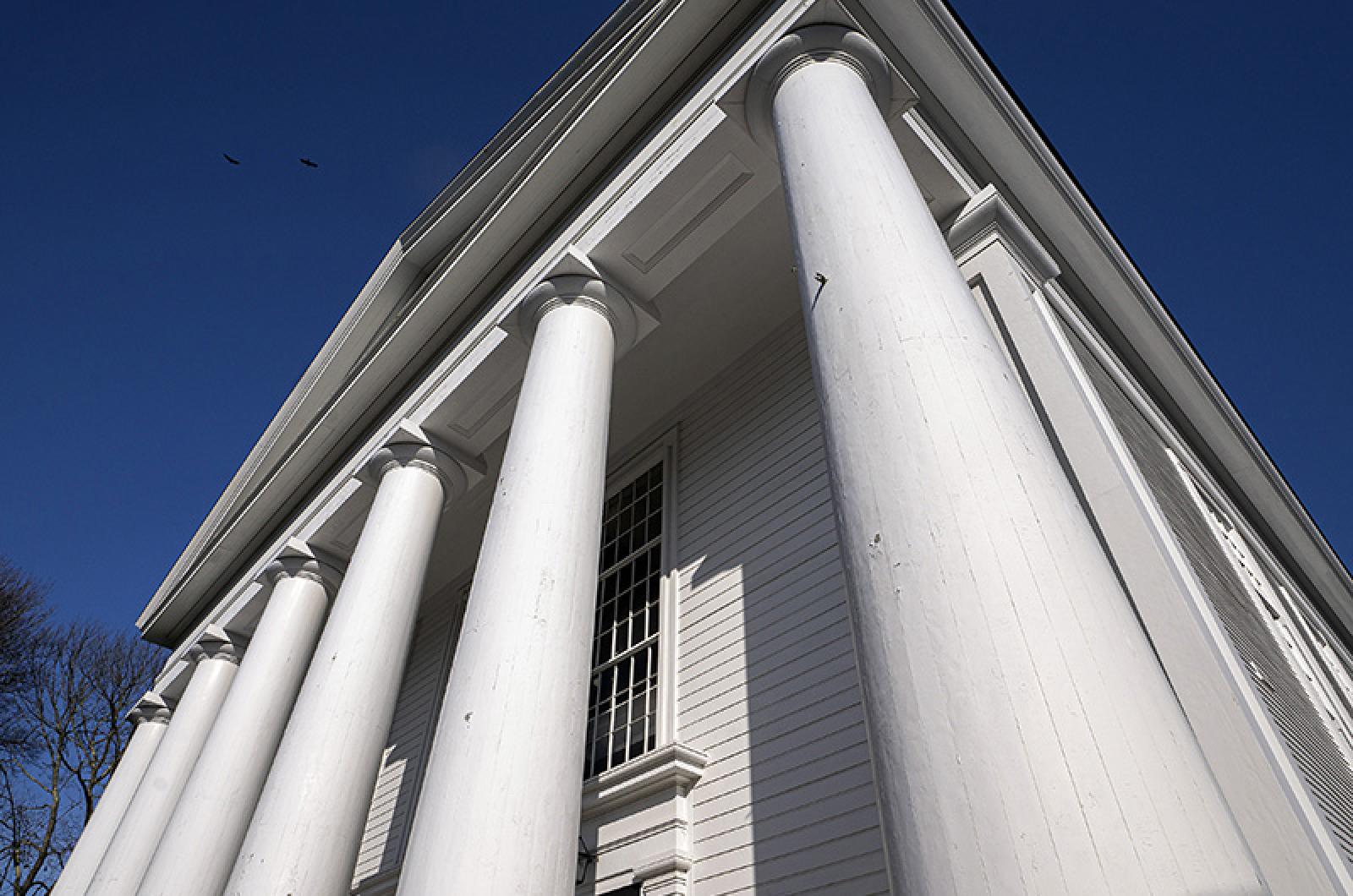When Edgartown voters gather at the recently-restored Old Whaling Church Tuesday for town meeting, they will weigh in on issues ranging from a new fire station to a proposed ban on miniature liquor bottles.
The annual and special town meetings begin at 7 p.m. on April 11, with town poet laureate Steve Ewing moderating for the third year in a row. The quorum is 210 people.
The annual town warrant contains 79 articles, while the special town meeting warrant contains 15 articles. This year, Edgartown is looking at an operating budget of $42.7 million, an increase of 5.42 per cent from last year.
“There aren’t really any controversial bylaws this year,” said town administrator James Hagerty. “It’s mostly just spending.”
A large chunk of that spending may come from a $21.5 million proposed fire station rebuild. After a 2019 feasibility determined that the 57-year old building was in need of replacement, the fire station building committee compiled bids and worked out design plans for a new station that would feature a shared community training and meeting space.
“The current was originally built in 1966, and the population has increased since then, the amount of calls have increased since then,” Mr. Hagerty said.
The article needs a two-thirds majority to pass and will also need voter approval at the town election on April 13. If passed, the debt exclusion would add about $70 to the tax bill of a $500,000 property.
Another article would continue Edgartown’s focus on major wharf repairs as the town looks ahead to climate resiliency in the face of rising tides. Last summer, the town completed a $4 million capital project to raise Memorial Wharf 18 inches and rebuild its aging infrastructure. This year, the town looks to do the same for North Wharf, appropriating at least $2.6 million to the effort on top of $900,000 previously-allocated funds.
“We only have the bandwidth to do one major harbor project a year,” Mr. Hagerty said. “But if you look at Memorial Wharf, people seem to be pretty happy.”
That article would also need a two-thirds majority and a ballot vote; the tax increase for a $500,000 property is estimated at $15.
Edgartown will also look to replace its Animal Control building with a brand new $720,000 facility, since the current one is unable to house animals in its outmoded kennels.
“Every time we take in an animal we have to go to a vet in town because our facilities are so outdated,” Mr. Hagerty said.
Other major investments include a proposed $980,000 to build a playground and outdoor learning space at the Edgartown School.
“That’s a good amount of money,” Mr. Hagerty admitted, but added that after double-checking the cost estimate, which includes redoing the current playground’s foundation and making sure the space is compliant with the Americans with Disabilities Act, the price tag checked out. Mr. Hagerty also pointed out that in line with the general population trend in Edgartown, the school’s enrollment numbers have increased.
“More children mean more services,” he said.
All Island towns will vote on whether to approve a $2 million feasibility study to potentially rebuild or renovate the Martha’s Vineyard Regional High School in an article submitted by the regional high school committee. That cost will be shared by all the towns, the amount depending on another article which asks town residents to approve a revised version of the regional school district’s Regional Agreement, which includes funding formula percentages. If both articles pass, Edgartown’s share of the project will cost $602,600.
Mr. Hagerty anticipates both articles will prompt significant discussion. That cost is expected to be shared by all the towns.
Edgartown joins Oak Bluffs with a proposed ban on alcohol containers under 100 milliliters, colloquially known as “nips.” Mr. Hagerty said the proposal has garnered a wave of public support, but the warrant article seeks to bridge the gap between fervent supporters and the liquor store owners who have expressed dissent. If approved, the ban would not go into effect until May 2024, giving liquor stores time to sell off their inventory. Last year, Nantucket approved a ban on a similar timeline.
Nantucket previously enacted a ban of all plastic bottles under 100 milliliters and Falmouth banned miniature bottles of all kinds. Mr. Hagerty said that Falmouth’s approach seemed to yield better results.
“[Nip bans] are happening everywhere and eventually it’s going to come here,” Mr. Hagerty said, citing similar legislation in Boston and other parts of Massachusetts. “I think it’s a reasonable article for everyone involved.”
The special town meeting warrant contains several articles pertaining to town management of Norton Point Beach, which is owned by Dukes County but was recently leased to the town. Prior to town management, Norton Point had been managed by The Trustees of Reservations since 2006.
Although Norton Point will eventually become self-funding, with revenue from the sale of oversand vehicle permits cycling back into capital projects for the sensitive shoreline, Mr. Hagerty said that regulatory barriers prevent the town from setting up its revolving fund in time for this summer.
The special town meeting warrant includes an article to infuse a one-time payment of $110,000 to fund beach management this summer, with an additional proposed $265,000 in the annual town meeting to cover costs through 2024.
A petition article aimed at curbing light pollution is also on the warrant and, if passed, would require outdoor lighting in town to be “directed, placed and shielded” so that light “shall not be offensive to other residents.”
Even with a lengthy agenda, Mr. Hagerty expects the meeting to adjourn by 11 p.m. He encourages every resident to make the time to attend.
“Ultimately it comes down to whoever shows up,” he said. “That’s who gets to decide $50 million.”







Comments (12)
Comments
Comment policy »